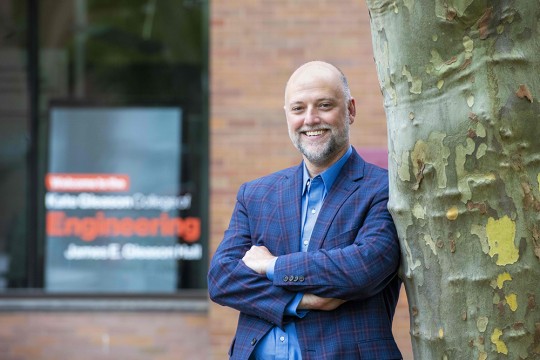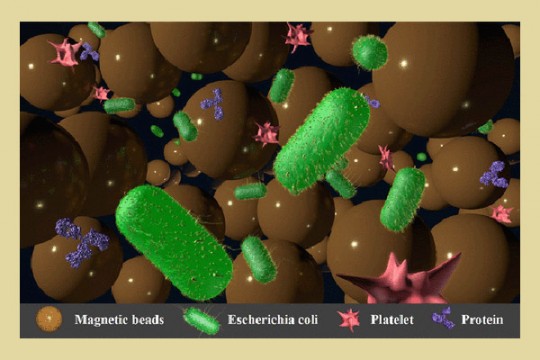News
Mechanical Engineering ME
-
September 3, 2024

Byron Erath joins RIT as mechanical engineering department head
Faculty-researcher brings expertise in using engineering principles to bio-inspired technology solutions
-
May 1, 2024

What’s being made in the SHED
Making at RIT has hit a new level now that several makerspaces in the Student Hall for Exploration and Development (SHED) have opened to provide students access to equipment and support for classwork, club advancement, and personal projects.
-
November 24, 2023

Overcoming obstacles: Students’ game-changing product breaks barriers
Students in RIT’s Multidisciplinary Senior Design (MSD) program worked on The Overcomer, a patented device being used by children and adults with mobility challenges to play sports at the Special Olympics and in schools, nursing care facilities, sports leagues, and homes around the world.
-
April 10, 2023

Local NASA engineer projects path forward for Artemis program
WHEC-TV talks to Darcy DeAngelis ’20 BS/ME (mechanical engineering), who is working on NASA's Artemis program.
-
February 27, 2023

Interdisciplinary team heads to Ethics in Engineering Case Competition
An interdisciplinary pair of RIT students is headed to Bethesda, Md., to participate in the 2023 Lockheed Martin Ethics in Engineering Case Competition. Emma Nastro, a third-year museum studies student, and Lee Sortore, a fifth-year mechanical engineering student, will represent RIT at the competition, which is held Feb. 27 through March 1 at the Lockheed Martin Center for Leadership Excellence. This is the first time an RIT team has competed in this competition.
-
March 21, 2022

RIT Master Plan cuts tuition in half for eligible alumni
RIT is extending a special graduate tuition scholarship program to recent alumni as the COVID-19 pandemic enters its third year. The program helps alumni who graduated during the pandemic enhance their skill set for the new economy through master’s degrees that build upon collaboration, analytical thinking, complex problem solving, and flexibility.
-
December 13, 2021

RIT and UR professors awarded patent for use of carbon nanotubes for improving delivery of bio-therapies to targeted cells
RIT Associate Professor Michael Schrlau and Ian Dickerson from the University of Rochester Medical Center have received a patent to deliver biomolecules into cells through carbon nanotube arrays.
-
October 8, 2021

Faculty compensation is focus of NSF-sponsored research
To build understanding of faculty compensation systems and improve conversations around salary, several RIT faculty members are sharing their experiences with a National Science Foundation-funded multidisciplinary research team. The team’s goal is to significantly expand knowledge of best practices for faculty compensation to a broader community in higher education and provide insights to guide compensation practices.
-
August 30, 2021

Engineering faculty member receives NIH grant to develop biotechnology to better detect sepsis
As one of the leading causes of death in hospitals, sepsis becomes more complicated with the rise in bacteria most resistant to some of today’s antibiotics. If physicians can detect onset earlier, treatments could begin sooner. Ke Du, a mechanical engineering faculty-researcher, will be developing a microfluidic device to improve detection of drug resistant bacteria in blood.
-
July 1, 2020

How Students Built a 16th-Century Engineer’s Book-Reading Machine
Atlas Obscura features Ian Kurtz '18 BS/ME (mechanical engineering); Matt Nygren '19 BS/ME (mechanical engineering); Steven Galbraith, curator, Cary Graphics Arts Collection; and Juilee Decker, associate professor, Department of History.
-
May 8, 2020

RIT Honors Distinguished Faculty Awardees for 2020
RIT honored its 2020 class of Distinguished Faculty—Manuela Campanelli, Satish Kandlikar and James Perkins. The Distinguished Professor designation is given to tenured faculty who have shown continued excellence over their careers in teaching, scholarly contributions, lasting contributions in creative and professional work and service to both the university and community.
-
April 15, 2020

RIT researchers build micro-device to detect bacteria, viruses
Ke Du and Blanca Lapizco-Encinas, both faculty-researchers in RIT’s Kate Gleason College of Engineering, worked with an international team to collaborate on the design of a next-generation miniature lab device that uses magnetic nano-beads to isolate minute bacterial particles that cause diseases. This new technology improves how clinicians isolate drug-resistant strains of bacterial infections and difficult-to-detect micro-particles such as those making up Ebola and coronaviruses.


